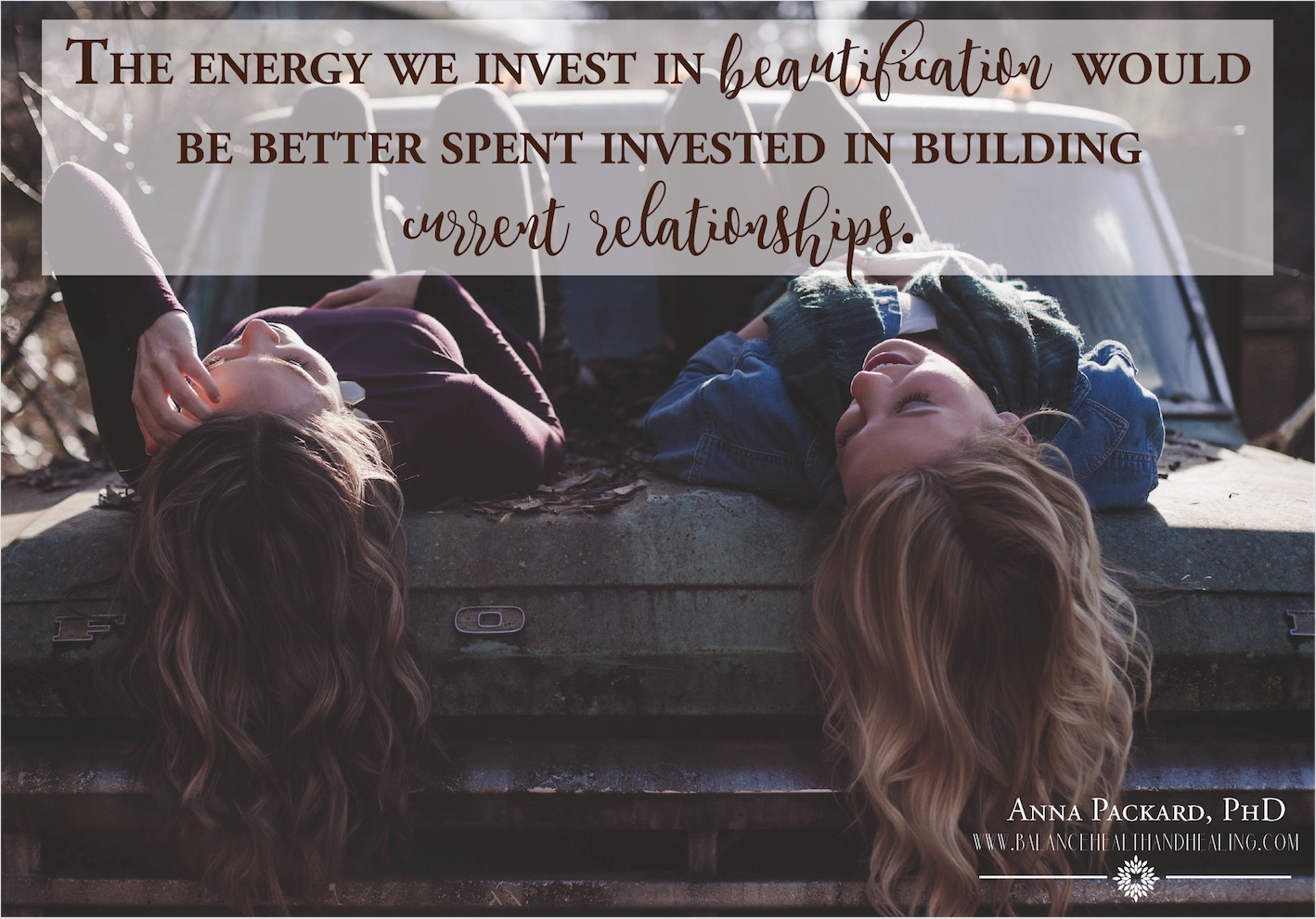A truth I know strongly is that relationships matter. In fact, relationships are foundational to our wellbeing in life. In 1943, Abraham Maslow conceptualized human needs. He identified that once our basic, fundamental physiological and safety needs are met, the next identified need we have is to feel love and belonging. We need each other to survive as well as to thrive in life. We need to feel accepted, valued, and that we have a place within a community of others.
A lot of our worries, behaviors, and endeavors relate intimately to this need to belong, feel loved and accepted. A common theme in my work with clients is the belief that becoming more aesthetically beautiful, according to cultural standards, will make them more likable and acceptable. Body image and weight loss behaviors are frequently wrapped around this ridiculous belief. There exists an underlying fear of rejection based on their current perceived looks. Some may have even experienced rejection or bullying in their past that reinforces the belief that in order to be accepted and liked, they have to conform to a cultural standard of beauty.
Given how fundamental our need to belong is, when it’s entangled with body image it can feel difficult or scary to challenge this negative belief. However, if we don’t challenge this belief, we remain stuck in unhealthy ways.
Perceived Flaws
First of all, if we believe that we are unacceptable or unlikeable as we are, we will spend a great deal of energy and anxiety trying to remedy perceived flaws. This can include excessive time getting ready.
Excessive time researching and carrying out exercise or beautification routines. Seeking out weight loss supplements or even spending a lot of money on plastic surgery. When we engage in behaviors like this, we reinforce the maladaptive belief that we must be different in order to be loved or liked. And getting one’s body to meet the standard that will “magically transform” your likeability is illusive. There will always be more pounds too lose or another flaw to fix.
Living in the Now
Second, while we’re busy engaging in these behaviors in an effort to change our appearance in hopes of having good future relationships, we’re missing out on our lives right now. Relationships occur in the present, not the future. The energy we invest in beautification would be better spent invested in building current relationships. Investing in relationships, instead of beautification activities, effectively challenges the maladaptive beliefs that we need to be different in order to have the relationships and closeness we crave.
Something I ask my clients that is helpful to emphasize this point is, “How much of your liking someone else depends on their weight and beauty?” Almost uniformly and very quickly, clients respond, “Not at all!”
Cultural Standards of Beauty
If we examine this further, we can see that meeting cultural standards of beauty often has the opposite effect. If someone seems to meet the ideal standard of beauty, or seems “perfect,” this elicits admiration (at best) and envy (at worst) by others. Admiration and envy are different from liking. When you admire or envy someone, you view them as “better” than you. Which serves to activate and highlight your own insecurities. When we feel insecure around someone, we are most likely to withdraw from them, not draw closer to them. Indeed, striving too much for an ideal standard of beauty can serve to repel others, not draw them to you.
When we think about those we like in our life and those we feel close to, what are common components? Relatability seems to be a central theme. We want to feel that we have things in common with them. Striving for ideal beauty leads to competition and disconnection. Whereas allowing ourselves to be human and imperfect, is connective and endearing. Beyond relatability, other themes include compassion, empathy, kindness, responsiveness, sense of humor, thoughtfulness, etc. How many of these attributes relate to our looks? None of them!
ourselves to be human and imperfect, is connective and endearing. Beyond relatability, other themes include compassion, empathy, kindness, responsiveness, sense of humor, thoughtfulness, etc. How many of these attributes relate to our looks? None of them!
It is brave and vital to change the belief system that our likeability and acceptability depend on our outward appearance. We relinquish this maladaptive belief system when we free ourselves up both psychologically and behaviorally. And we have more time to spend on investing in relationships, right now. Taking steps to build relationships now is the only way to feel more connected in our lives. And it’s through developing and investing in these relationships as our flawed, human-selves, that we’ll find the greatest acceptance, satisfaction, belonging and love.

